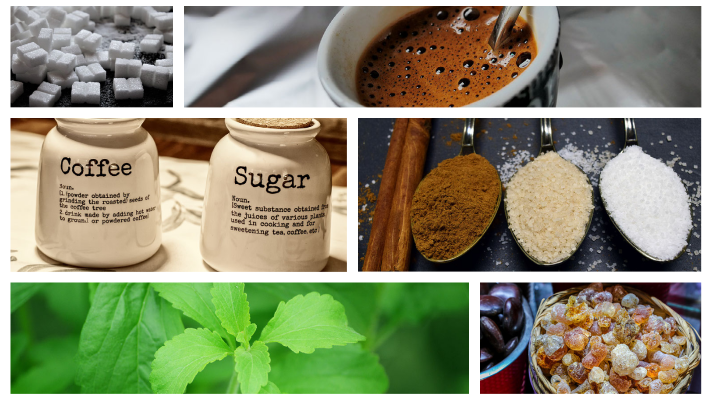Sugars and Sweeteners
How natural and artificial sweeteners affect in-cup flavor
There are no absolute rules in coffee because it is a personal experience. It's similar to asking someone how much ketchup you should put on your fries, and the answer is always “it depends” . Coffee is no different.
The way we talk about subjects is to not avoid the elephant in the room...
For most people coffee is bitter because they are drinking poorly roasted, prepared and brewed beans that are also stale. All these factors lead to an extremely bitter cup, which most people drink for medicinal reasons (caffeine), and to quote Julie Andrews in Walt disney’s Mary Poppins “ a spoonful of sugar helps the medicine go down”. So, people put sugar in coffee to make it drinkable (just like the sugars added in cough medicine). Some people get used to the bitterness and brag that they can drink coffee black without sugar. This tolerance for bitterness doesn't change the fact that the stale dark roast coffee is still bitter. Sugar substitutes are an effective tool in the consumers' bitter management strategies.
Marketing Terms for sweeteners
We are not biochemists or scientists, but maybe it will help to explain about sugars and sweeteners…
Sugars are sweet and have calories. Honey, white sugar, brown sugar, coconut sugar, fruit purees, molasses are all examples of sugars.
Everything that is sweet and is not sugar is a sugar substitute. Where it gets confusing is when people use the term sweetener, artificial sweetener or natural sweetener, because sugar is also a natural sweetener. We don’t like these terms because they are marketing terms designed to mislead and confuse. For the sake of clarity we propose using the term sugar substitute to help make things clearer.
Examples of sugar substitutes are sweet and low (saccharin-based) , nutrasweet (aspartame-based), splenda (sucralose-based).
Aspartame and saccharin have no calories and sucralose has some calories, much less than sugar because it is technically a sugar alcohol.
Stevia is a plant whose leaves are sweet, however you can't just grind leaves into your coffee because it has to be extracted and concentrated first. The so-called natural sweetener actually needs to be man-made processed. To extract it you need a complex process to extract the sweet component and concentrate it for consumer use.
While we are on the topic of sweeteners, saccharin which was used in some foods, drinks, candies and medicines at one time in history had a health scare because of the possible link to negative effects on human health. In Canada Saccharin has been delisted as a food additive since the 1970’s because scientific research showed it caused cancer in rats. There wasn’t conclusive research showing it caused cancer in humans and in May 2016 Saccharin was once again allowed as a food additive in Canada because further in-depth scientific research has proven that the cancer found in rats was never found in humans.
How do sweeteners affect the coffee taste?
Obviously the different sugar substitutes have different flavours and these different flavors affect the taste. To do a proper controlled double blind study to see which sugar substitutes are preferred over others is beyond our scope. It's like trying to determine what objectively is the best tasting cola in the world. In reality the only people motivated to mimic such studies are those in the marketing department of the cola companies. The bigger issue, or question, is why do people need sugars to fix the bitter in coffee? Our way to answer this question is to say stop drinking coffees that taste so bitter. You can do this by buying high quality beans that are not over roasted (burnt and dark) , prepared by people (artisan baristas) who know how to extract coffee from fresh beans (3-14 days from roast). If you do all of this your coffees will be less bitter and you will use less sugar or sugar substitutes because you won’t need to hide the tastes.
What we find confuses people the most is they forget coffee is a food. Simply put it is something that we consume. Just like adding ketchup on the fries, we all have our personal reasons for how much we put on, in other words, there are no special rules in coffee.
References:
- https://www.healthline.com/health/food-nutrition/monk-fruit-vs-stevia
- https://www.carolina.com/knowledge/amp/story/2020/02/28/genetic-differences-affecting-taste-and-smell
- https://www.canada.ca/en/health-canada/services/food-nutrition/food-safety/food-additives/sugar-substitutes/saccharin-artificial-sweeteners.html
- https://gazette.gc.ca/rp-pr/p2/2016/2016-05-04/html/sor-dors74-eng.html




